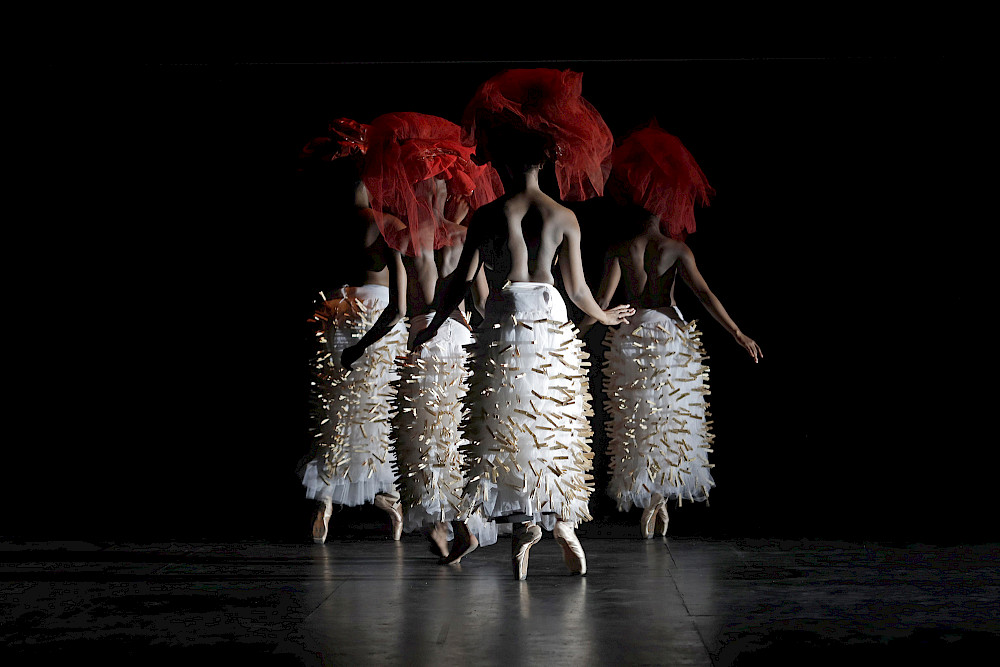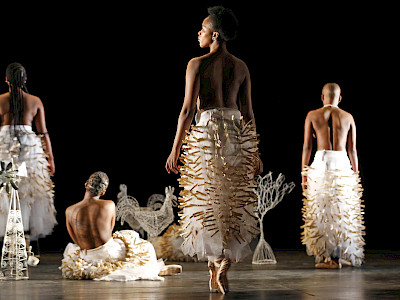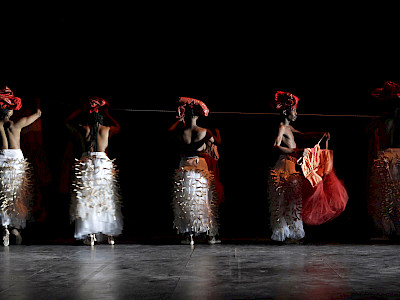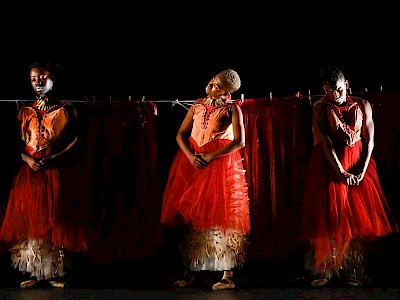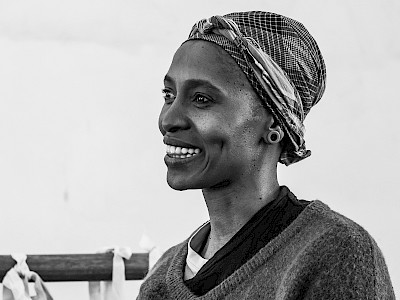11 — 13.05.2024
Ten dancers timidly balance en pointe with their backs to the audience while Camille Saint-Saëns’ The Swan plays. So opens HATCHED ENSEMBLE. While hiding their faces, they display small, handcrafted ironwork sculptures. The captivating choreography is the brainchild of South African artist Mamela Nyamza, who unapologetically demystifies and deconstructs the history of dance while trampling the norms and standards of the classics. Using simple household materials – clothes pegs, a clothes line, plastic ponchos and red aprons – the dancers evoke images of domestic labour that evolve in precise and touching fashion. Referencing Western classical music, dance and South African vocal scores, they juxtapose the movement vocabularies of diverse cultures. The dancers convey deeply personal stories that challenge race and gender norms, their movements peppered with moments of miniaturised ballet performed with frantic, joyful release. Minor gestures and major sensitivity combine to open up an entire universe unknown to dance history, overflowing with urgency and subtle virtuosity.
“A groundbreaking and innovative project that challenges the traditional norms of ballet dance.”
Kedibone Modise
“HATCHED ENSEMBLE powerfully conveys challenging issues of tradition. An insightful, thought-provoking, and deeply moving production.”
Sivenathi Gosa
The One who Carries Impossible Histories
When you are the one who, carrying impossible histories, has been consistent in your stance of protest and watchfulness;
When you are the one who opens your artmaking to otherworldly guides, which should unsettle and dislodge your elegance;
What do you create, in your demanding and deliberate way, which contains all of yourself and at the same time, gives it all away?
“The original piece began its journey with a dream of red: that vivid red [...] to me represents love, danger, but also my own ‘bloodied’ relationship with things.”*
Mamela Nyamza first made Hatched in 2007, as a solo work. Her then young son, Amkele Mandla, joined her on stage with crayons and paper, busy colouring while his mother performed with washing line and pegs, on pointe. A lyrical but direct statement speaking both to the ostensive content of the piece, and to the demanding intermingling of the personal and professional for a young black woman in South Africa.
“I come from a background of ballet that does not accept me as a black dancer. In the discipline of dance itself, dancers are always put down, and I have fought that throughout my career.”*
Mamela’s lifelong negotiation of her performing body and her professional self has been driven by the fight for means, recognition and dignity. In Apartheid South Africa where black people were relegated to the status of ‘third class’ citizens, structural racism and daily racist injustices made her pursuit of excellence in the discipline of dance an arduous task. These obstacles have existed not just at the level of means, access and networks, but also in the cultural-psychological underpinnings of ballet and of dance more generally as an institutionalised cultural form. Ballet training to young bodies draws reference in form and line from canonical white bodies: the perfection of a tightly tied hair bun where straight hair lies flat on the scalp and twists into a small globe on the head. The body structure a faint impression of lean taut muscle.
In South Africa, Mamela is one of our revered, contemporary greats, reshaping dance to fit the shapes and musculatures and scarification of the black South African body and experience. She has lived through expressions of hatred against women and against queer bodies, both in her life and in her family. She has raised her voice against injustice, has taught ballet to new generations, created dance programming locally, and toured internationally.
In 2018, she revisited Hatched, bringing with her the same red, the same physicality and arresting presence. Amkele, at this point 18 years old, joins her on stage at a later moment in the work. A young man now, he faces the audience and raps as his mother steps back, but not away. In reforming the solo work as an ensemble piece, Mamela extends the idea of progeny explored in the first iteration of the work, from the personal into the professional realm.
“I hand-picked them because I have been watching these ballet dancers who are black, not continue.
[...] One of them came from the same school I came from in Cape Town in Gugulethu, I actually taught her when she was 6 years old and I was the Dance Vice Principle in that school.
[...] It kind of bothered me as an artist why are these artists from ballet always like, letting go?
[...] So I’m like Oh God! I need to do this work, I need to do this work.
This one that I taught in 2006, [...] she is in HATCHED [ENSEMBLE] you know, and for me it’s like a circle of life.
I’ve been really excited seeing her coming back to life, differently.
[...] I had 4 weeks with them.
I didn’t have more time, went straight into it.
Some of them had thrown their pointe shoes away
‘Oh no, sisMamela, I no longer have pointe shoes’
I’m like ‘Oh my God, do I have to now buy pointe shoes for these kids or what!?’
and pointe shoes are expensive.
[...] I felt like there was a hunger from them to work with me, you know.
Sometimes you hear ‘I don’t want to do Mamela’s work because you don’t dance too much’.
But they were hungry to do the work I do.
And that was exciting.”**
At the premiere of HATCHED ENSEMBLE in Makhanda, South Africa, the tension hung like taut fog. Many pegs on layers of tulle, shuffling and shifting and clicking with each other, antagonising the classic piano. Bodies slide across stage and gender. Grit and poise. As the dancers unfurled, the audience whistled, here and there – by the end, they were out of their chairs, dancing. At the run at the Market Theatre in Johannesburg, folks were even singing with the music. Bodies respond to each other, giving sound to the release and their pleasure. They hold the dancers and the dancers hold the room.
“I told them, you don’t have to make them like or love what you are doing.
Don’t overdo what you are doing
Calm down, don’t over perform it, don’t perform for me.
You know.
Be yourself.
When you go inside yourself, anything can happen.”**
- Rucera Seethal, 22nd of April 2024
Rucera Seethal is the artistic director of the multi-disciplinary National Arts Festival in Makhanda, South Africa.
* Interview with Mamela Nyamza by Alx Phillips, posted June 7, 2016 https://lookingfordrama.com/2016/06/3608/
** Interview with Mamela Nyamza by Sarah Israel and Rucera Seethal, as part of the Listening Bodies podcast project, Refuge Worldwide, conducted November 23, 2023. Currently unpublished.
Presentation: Kunstenfestivaldesarts, KVS
Concept, choreographer and director: Mamela Nyamza | Performers: Kirsty Prettygirl Ndawo, Kearabetswe Michelle Mogotsi, Khaya Ndlovu, Thamsanqa Tshabalala, Tania Mteto, Itumeleng Sifiso Chiloane, Amohelang Reitumetse Rooiland, Noluyanda Florence Mqulwana, Sonia Zandile Constable, Thimna Sitokisi | Opera singer: Litho Nqai | Multi instrumentalist: Azah “Given” Mphago | Technical manager: Thabo Pule | Costume co-designers: Mamela Nyamza & Bhungane Mehlomakulu
Coproduction: National Arts Festival (Makhanda, South Africa) supported by: The National Arts Council of South Africa
